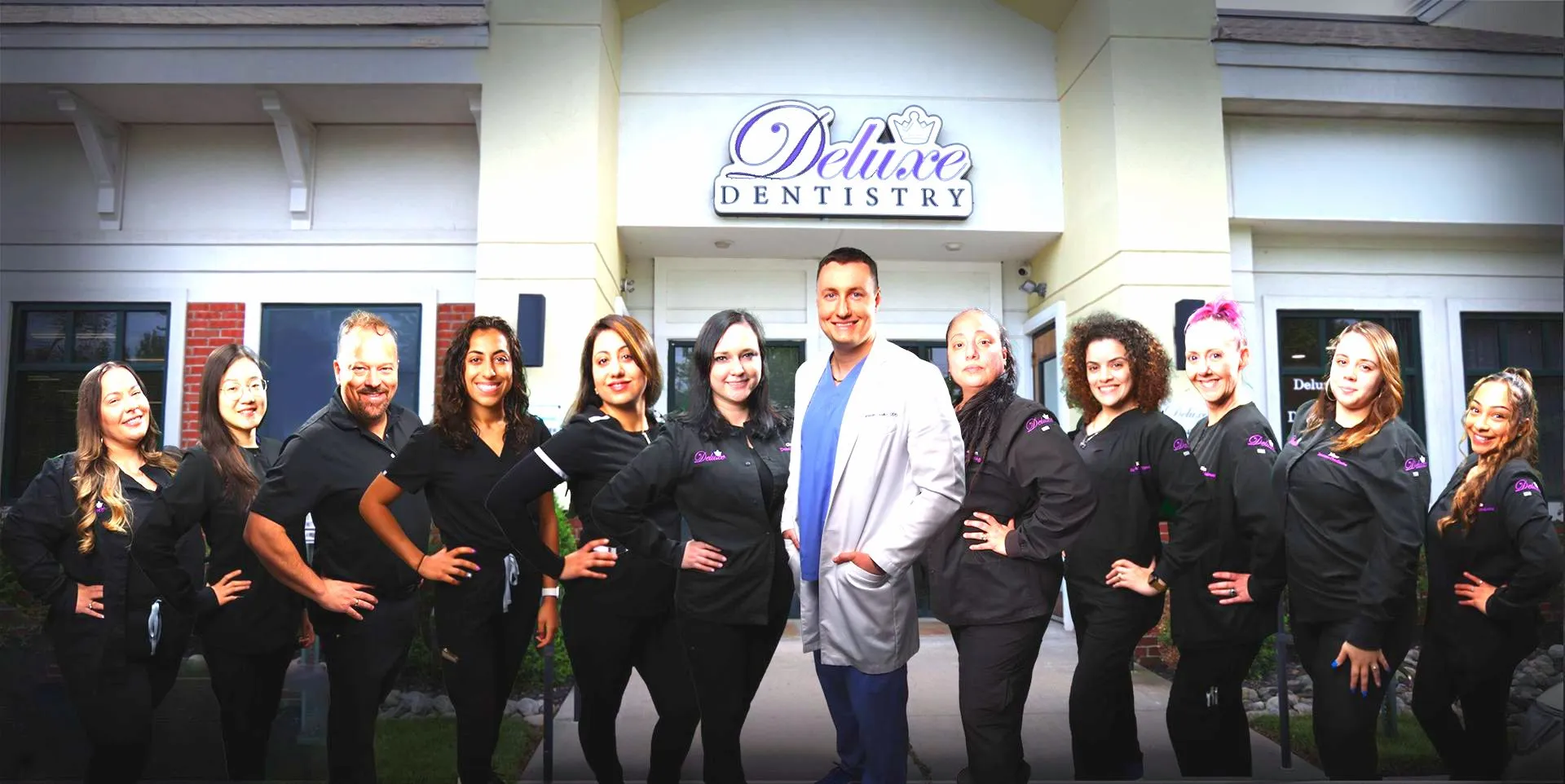Schedule Your Personalized Dental Consultation Today: CLICK HERE
At Deluxe Dentistry, we understand that dental visits can cause anxiety and discomfort for some patients. That's why we offer a range of sedation dentistry options to help you experience dental care in a relaxed and pain-free manner. We take the time to sit down with each patient to discuss and determine the best sedation option for their individual needs. Our goal is to provide a comfortable and anxiety-free experience, ensuring that your visit to our office is as pleasant and stress-free as possible.
Nitrous oxide is an excellent choice for patients who experience mild to moderate anxiety about dental visits. It's ideal for those who want a quick, effective way to relax without significant sedation effects. Additionally, nitrous oxide is suitable for patients who need to resume normal activities, like driving, immediately after their appointment.
Oral sedation is a great option for patients who are afraid of needles and experience higher levels of anxiety about dental procedures. It provides a deep sense of relaxation and can help manage more significant fears, allowing you to feel more at ease throughout your treatment. You may feel groggy and could even doze off at times, but unlike general anesthesia, you won't be fully asleep the entire time.
IV sedation is ideal for patients undergoing longer procedures or those with severe anxiety who need a deeper state of relaxation. It provides a higher level of sedation and allows for precise control of your comfort throughout the treatment, making complex or extended procedures much more manageable. You may feel groggy and could even doze off at times, but unlike general anesthesia, you won't be fully asleep the entire time.
A combination of oral and IV sedation is ideal for patients who need a deeper level of relaxation for longer or more complex procedures but prefer the initial ease of oral sedation. This approach offers both the sustained calmness of oral sedation and the enhanced control and comfort of IV sedation, making it suitable for those with significant anxiety or procedural demands. You may feel groggy and could even doze off at times, but unlike general anesthesia, you won't be fully asleep the entire time.
If you want to be completely asleep during your procedure, General Anesthesia, also known as twilight sedation, is the option for you. It ensures you're fully unconscious and unaware, providing the deepest level of sedation for a stress-free experience.
At Deluxe Dentistry, we understand that visiting the dentist can be a source of anxiety for many people. That's why we go above and beyond to ensure every patient feels comfortable and respected from the moment they walk through our doors. We're incredibly proud to have a 5-star rating on Google, with over 600 glowing testimonials from patients who have experienced our commitment to exceptional care firsthand. Our dedicated team, led by Dr. Godko, strives to treat every patient with the utmost respect and personalized attention, ensuring a positive and stress-free experience at each visit. Your oral health and comfort are our top priorities, and we are here to support you every step of the way.
Laughing Gas - Nitrous Oxide Is The Most Common Sedation
Nitrous oxide, commonly known as "laughing gas,"is a mild sedative used to help patients relax during dental procedures. It is inhaled through a mask or nosepiece.
When inhaled, nitrous oxide creates a sense of calm and relaxation within a few minutes. It helps reduce anxiety and discomfort, making dental treatments more comfortable.
Yes, nitrous oxide is considered very safe when administered by trained dental professionals. It is a commonly used sedation method in dentistry.
Yes, nitrous oxide allows you to remain awake and aware during the procedure, but you will feel relaxed and less anxious.
Yes, the effects of nitrous oxide wear off quickly after the gas is stopped, usually within a few minutes. You can drive yourself home and resume normal activities shortly after your appointment.
With Nitrous Oxide / Laughing Gas provides mild sedation and keeps you fully awake, while IV and oral sedation offer deeper relaxation, making you groggy or semi-conscious during the procedure. Unlike general anesthesia, where you are fully asleep throughout the entire procedure.
Nitrous oxide is suitable for patients with mild to moderate dental anxiety, those undergoing routine dental work, or individuals who want a quick and easy way to relax during their visit.
Side effects are rare but may include mild nausea or dizziness. These typically resolve quickly once the gas is no longer being inhaled.
Nitrous oxide is administered through a mask or nosepiece that covers your nose. You breathe normally, and the dentist adjusts the level of sedation as needed.
Patients with certain medical conditions or respiratory issues should consult their dentist to determine if nitrous oxide is suitable for them. Pregnant women and those with a history of substance abuse should also avoid it.
Nitrous oxide, commonly known as “laughing gas,” is a popular sedation option that helps patients relax during dental procedures. You’ll inhale the gas through a mask or nosepiece, and its calming effects will start within three to five minutes. Your dentist carefully controls the amount of sedation and adjusts it as needed throughout your treatment. After your procedure, you’ll receive pure oxygen to clear the nitrous oxide from your system. Because the effects wear off quickly, you’ll be able to drive yourself home shortly after your appointment.
With oral conscious sedation, your dentist gives you a sedative medication, usually in the form of a pill or liquid, about an hour before your procedure. This method offers excellent sedation qualities, ensuring a pain-free experience. Oral sedation may make you feel quite groggy, and you might even fall asleep, but you’ll still be able to communicate with your dentist if needed. Since oral sedation affects your memory and motor skills temporarily, you'll need a friend or family member to drive you home after your appointment.
IV sedation, or intravenous sedation, involves administering sedative medication directly into your bloodstream, putting you into a deeply relaxed state. While you may feel drowsy and even drift in and out of sleep, you'll remain conscious and responsive throughout the procedure. This approach is ideal for patients who are anxious or nervous, as it helps ease those feelings and makes the experience more comfortable. Unlike general anesthesia, you won't be fully asleep, but you'll be calm and at ease. IV sedation also allows for more complex treatments to be completed in fewer appointments, and many patients experience partial or complete memory loss of the procedure. This method ensures your comfort and peace of mind during your dental visit, making the process much easier to manage.
Combining oral and IV sedation offers enhanced benefits for your dental procedure. Oral sedation will help you feel relaxed at the start, while IV sedation provides more precise control over your level of sedation during treatment. You may feel groggy and could even doze off at times, but unlike general anesthesia, you won't be fully asleep the entire time. This combination significantly reduces anxiety, maximizes comfort, and allows more complex procedures to be completed efficiently. Most patients have little to no memory of the procedure, ensuring a pain-free and stress-free dental experience.
With general anesthesia, also known as twilight sedation, you will be fully asleep for the entire procedure. Administered by an anesthesiologist, this method ensures you are completely unconscious, eliminating any awareness or discomfort during treatment. It's ideal for highly anxious patients or complex procedures, guaranteeing a pain-free experience. Your vital signs will be closely monitored by the anesthesiologist, prioritizing your safety while allowing the dental team to work efficiently. General anesthesia offers the ultimate in comfort and anxiety relief, ensuring a smooth and stress-free dental visit.

At Deluxe Dentistry, we are proud to be one of the few practices in our area certified to offer a full range of sedation options, from nitrous oxide and oral sedation to IV sedation and general anesthesia with an anesthesiologist. No matter which sedation method you choose, our highly trained team will closely monitor you throughout your procedure to ensure your safety and comfort. Our commitment to providing comprehensive, stress-free dental care means you can relax, knowing you're in capable and caring hands.
If you have a lot of Anxiety we commonly use Oral and IV Sedation.
IV (intravenous) sedation involves administering sedative drugs directly into the bloodstream through a vein, providing a deep level of sedation quickly and allowing the dentist to adjust the sedation level as needed during the procedure.
Oral sedation involves taking a sedative pill, usually about an hour before the dental procedure, to help you relax. It provides a lighter level of sedation compared to IV sedation and does not require needles.
IV sedation works almost immediately since the medication is delivered directly into the bloodstream. Oral sedation takes longer, typically30-60 minutes, as the medication needs to be absorbed through the digestive system.
The duration of IV sedation can be controlled and adjusted during the procedure, providing flexibility in the depth and length of sedation. Oral sedation generally lasts a few hours, depending on the dosage and type of medication used.
IV sedation is often preferred for extensive dental procedures because it provides a deeper level of sedation and can be adjusted throughout the treatment. Oral sedation may be suitable for shorter or less invasive procedures.
With IV sedation, oral sedation, or a combination of both, you may feel groggy and could even doze off at times. However, unlike general anesthesia, you won't be fully asleep throughout the entire procedure. Most patients have little to no memory of the experience, ensuring a pain-free and stress-free visit.
Both IV and oral sedation can cause drowsiness, grogginess, and amnesia for the procedure. IV sedation may also cause a brief period of dizziness or lightheadedness. Side effects vary depending on the individual and the sedative used.
Both types of sedation are generally safe when administered by trained professionals. However, IV sedation carries slightly higher risks due to the deeper level of sedation and the need for venous access. A thorough medical history and evaluation are essential for minimizing risks.
Yes, for both IV and oral sedation, it is important to have someone accompany you to and from the dental office, as you will not be able to drive or operate machinery for several hours after the procedure.
Not everyone is a candidate for sedation. Patients with certain medical conditions or allergies may not be suitable for IV or oral sedation. A thorough consultation with our dentist will help determine the best option for you.
Follow your dentist's instructions, which may include fasting for a certain period before the appointment, arranging for transportation, and avoiding certain medications or substances. Specific guidelines will be provided based on the type of sedation you will receive.
-1920w.webp)
Dr. Godko, originally from Ukraine, fulfilled his lifelong dream of becoming a dentist after earning his DDS from New York University College of Dentistry.
Known for his gentle touch and top clinical skills, he specializes in dental surgery and aesthetic smile makeovers. Fluent in English, Russian, and Ukrainian, Dr. Godko is committed to continuous learning and has completed extensive continuing education, including becoming a Fellow of the International Congress of Oral Implantology. Dedicated to giving back, he volunteers his expertise both locally and internationally. In his free time, Dr. Godko enjoys traveling and spending time with his wife, Olena. His memberships in professional organizations underscore his commitment to excellence and patient trust in his care.
At Deluxe Dentistry, we are a full-service practice, offering comprehensive dental care including cosmetic dentistry, oral surgery, endodontics (root canals), implants, prosthodontics, and treatment for sleep apnea and snoring, beyond the scope of general dentistry.
Schedule a Consultation